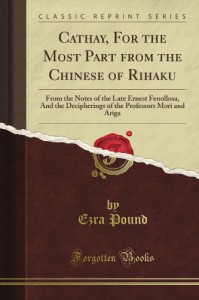Currently reading
Cathay , translations by Ezra Pound with Ernest Fenollosa


Ezra Pound (1913)
Ezra Pound (1885 – 1972) had his fingers in many pies, some of which were hot enough to burn him badly. One of these pies was the translation of poetry into English. Over his lifetime he published translations from at least 10 different languages, though of some of these, like Chinese, he had only a very weak grasp. However, he did have the papers of the great cultural explorer Ernest Fenollosa (1853–1908) which included more or less literal translations of poems by the great T'ang dynasty poet Li Po (Li Bai) and others.(*) On the basis of these notes Pound wrote the "translations" published in his Cathay (1915). Needless to say, sinologists object to these "translations", but they are without a doubt fine English poems.
His "translations" are also of great significance for readers like myself who are ignorant of the Chinese language and know well that they will never have the time and energy required to learn one of the most difficult languages on earth, because Pound's translations provided the initial impetus to the now extensive tradition of English language translations of Chinese poetry. As T.S. Eliot wrote, "Chinese poetry, as we know it today, is something invented by Ezra Pound." Of course, this is no longer true because great poet-scholars like Arthur Waley started producing real translations from the Chinese.(**)
It is for these reasons I want to draw your attention to these poems. To give you a taste of their poetic quality I will quote a few; and to give you a sense of how they are approximate, I will quote some versions by other translators of the shorter poem. The first poem is by Qu Yuan (343–278 BCE), identified by his Japanese name, Kutsugen, in this book. It is a lament by a soldier for whom the campaign has gone on much too long.
Song of the Bowmen of Shu
Here we are, picking the first fern-shoots
And saying: When shall we get back to our country?
Here we are because we have the Ken-nin for our foemen,
We have no comfort because of these Mongols.
We grub the soft fern-shoots,
When anyone says "Return", the others are full of sorrow.
Sorrowful minds, sorrow is strong, we are hungry and thirsty.
Our defence is not yet made sure, no one can let his friend return.
We grub the old fern-stalks.
We say: Will we be let to go back in October?
There is no ease in royal affairs, we have no comfort.
Our sorrow is bitter, but we would not return to our country.
What flower has come into blossom?
Whose chariot? The General's.
Horses, his horses even, are tired. They were strong.
We have no rest, three battles a month.
By heaven, his horses are tired.
The generals are on them, the soldiers are by them.
The horses are well trained, the generals have ivory arrows and quivers
ornamented with fish-skin.
The enemy is swift, we must be careful.
When we set out, the willows were drooping with spring,
We come back in the snow,
We go slowly, we are hungry and thirsty,
Our mind is full of sorrow, who will know of our grief?
Remarkably, the answer 2,300 years later is: I will. And you?
Here are versions by different translators of a poem by Li Po. By Pound:
The Jewel Stairs' Grievance
The jewelled steps are already quite white with dew,
It is so late that the dew soaks my gauze stockings,
And I let down the crystal curtain
And watch the moon through the clear autumn.
By David Hinton:
Jade-Staircase Grievance
Night long on the jade staircase, white
dew appears, soaks through gauze stockings.
She lets down crystalline blinds, gazes out
through jewel lacework at the autumn moon.
By Tony Barnstone:
Grievance at the Jade Stairs
The jade steps are whitening with dew.
My gauze stockings are soaked. It's so late.
I let down the crystal blind
and watch the glass clear autumn moon.
The full text of Cathay can be found here:
http://archive.org/stream/cathayezrapound00pounrich/cathayezrapound00pounrich_djvu.txt
The full text is also included in Pound's New Selected Poems and Translations (New Directions) which I recommend strongly to anyone new to Pound. By the way, the Classics Reprints Series pictured above is to be avoided.
(*) Rihaku is the Japanese name for Li Po. Fenollosa lived in Japan and learned about Chinese language and literature from Japanese masters. This is why most of the proper names in Pound's translations are Japanese instead of Chinese.
(**) As a matter of fact, Pound was instrumental in getting Waley's first translations into print.
 3
3












